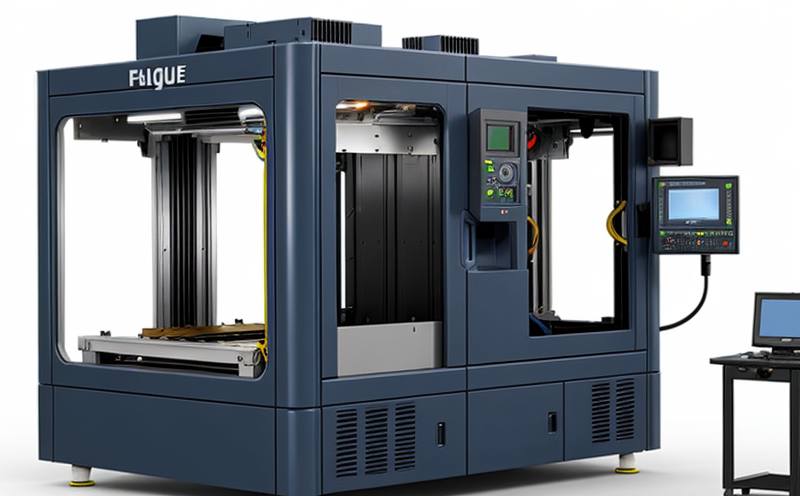ASTM D671 Flexural Fatigue Testing of Rigid Plastics
The ASTM D671 standard is widely recognized as a cornerstone in the field of materials testing, particularly for assessing the flexural properties and fatigue behavior of rigid plastics. This service focuses on the flexural fatigue testing method outlined in ASTM D671, which evaluates how a material withstands repeated bending stress over time without fracturing. The procedure is crucial for ensuring the reliability and durability of plastic components used in various sectors such as automotive, aerospace, and manufacturing.
The process begins with the selection and preparation of specimens that accurately represent the intended product design. Specimens are typically prepared from rigid plastics like polyvinyl chloride (PVC) or polycarbonate (PC), which are subjected to controlled bending stress in a testing machine. The specimen is clamped at one end while it undergoes cyclic loading at the other, simulating real-world conditions of repeated mechanical stress.
The testing apparatus used for this procedure includes an electromechanical fatigue tester capable of applying precise and reproducible loads. The test setup ensures that the bending moment applied to the specimen is consistent with the expected service condition. This method allows for a controlled environment where the effects of fatigue can be observed without the influence of other variables such as temperature or humidity.
The testing protocol involves subjecting the specimens to a predetermined number of cycles, typically thousands, and recording the load at which failure occurs. The results are analyzed using statistical methods to determine the fatigue life of the material under specified conditions. This data is then used by engineers and designers to improve product design and ensure compliance with regulatory standards.
The ASTM D671 method provides a standardized approach to testing, ensuring that comparisons between different materials or manufacturers can be made consistently across industries. Compliance with this standard helps manufacturers demonstrate the reliability and durability of their products in competitive markets. By adhering to these rigorous tests, companies can enhance trust among end-users who rely on robust components for critical applications.
The importance of ASTM D671 cannot be overstated, especially in sectors where safety and performance are paramount. For instance, the aerospace industry relies heavily on this test method to ensure that plastic parts used in aircraft structures can withstand the harsh conditions of flight. Similarly, automotive manufacturers use these tests to validate the integrity of components such as dashboards or seats.
In summary, ASTM D671 flexural fatigue testing is essential for quality assurance and reliability assessment. By following this standard, laboratories ensure that their clients receive accurate results that reflect real-world conditions, thereby supporting informed decision-making in product development and manufacturing.
Quality and Reliability Assurance
The ASTM D671 flexural fatigue testing service plays a critical role in quality control processes. By employing this standardized test method, laboratories can provide clients with confidence that their products meet stringent industry standards. The results of these tests are used to identify any weaknesses or areas for improvement in material selection and design.
For manufacturers, the ability to demonstrate compliance with ASTM D671 is crucial for maintaining a strong reputation within competitive markets. This service helps companies to ensure that their products are safe, reliable, and capable of performing consistently over extended periods. The data obtained from these tests can also be used during design iterations to optimize product performance.
From a regulatory perspective, ensuring compliance with ASTM D671 is essential for avoiding potential legal issues and maintaining market access. Regulatory bodies often require companies to provide evidence that their products meet certain durability standards, making ASTM D671 testing a key component of compliance programs.
Environmental and Sustainability Contributions
The ASTM D671 flexural fatigue testing service also contributes positively to environmental sustainability efforts. By ensuring that materials are durable and reliable, this testing helps reduce waste associated with premature product failure. Reliable components last longer in use, minimizing the need for frequent replacements, which ultimately leads to less material consumption.
Additionally, the data obtained from these tests can inform sustainable design practices. Engineers can make informed decisions about material composition and component design based on fatigue performance data, leading to more efficient products that consume fewer resources during production and operation.
The environmental benefits extend beyond manufacturing processes; durable components also contribute to longer product lifespans in end-user applications, reducing the overall carbon footprint associated with resource extraction and manufacturing. By promoting sustainable practices through rigorous testing protocols like ASTM D671, laboratories play a vital role in driving industry-wide sustainability goals.
Use Cases and Application Examples
The ASTM D671 flexural fatigue testing service is applicable across various industries where the durability of rigid plastics is critical. One prominent application is in the automotive sector, where components such as dashboards, seats, and door panels are subjected to cyclic loading during vehicle operation.
In aerospace applications, this test method ensures that plastic parts used in aircraft structures can withstand the stresses of flight without failing prematurely. This includes cabin interior components like seating and trim pieces, which must maintain structural integrity over extended periods.
Manufacturers in the medical device industry also benefit from ASTM D671 testing. Medical devices often require rigid plastics that are both strong and flexible enough to perform their intended functions reliably. Testing these materials for fatigue ensures they can withstand repeated use without compromising patient safety or product performance.
Beyond these sectors, any manufacturer of products with plastic components that undergo cyclic loading should consider ASTM D671 testing. This includes consumer electronics, industrial machinery, and construction equipment, among others. By ensuring the durability of their materials through rigorous testing, manufacturers can improve product longevity and customer satisfaction.





